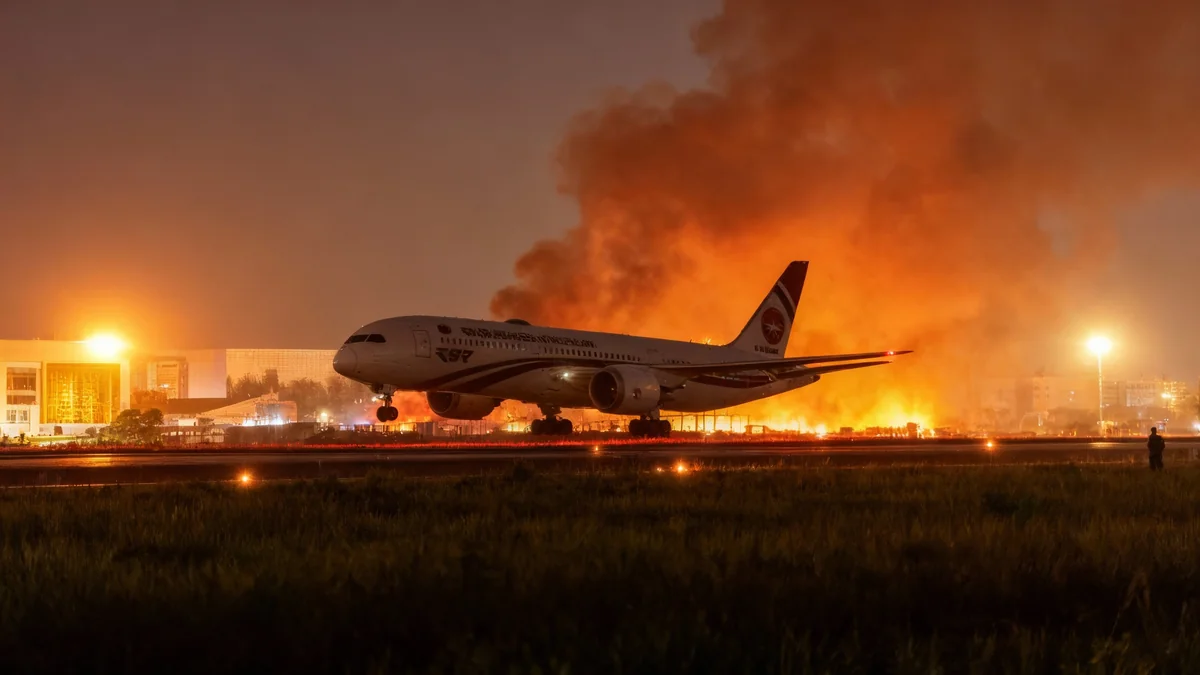A major fire at the cargo terminal of Hazrat Shahjalal International Airport in Dhaka, Bangladesh, led to the suspension of all flights for several hours on Saturday. The blaze generated significant black smoke visible from miles away, requiring extensive firefighting efforts and military assistance to bring it under control.
Key Takeaways
- A large fire erupted at Dhaka's main airport cargo terminal.
- All flights were suspended for several hours due to the incident.
- Dozens of firefighting units and military personnel responded.
- Planes were redirected to other airports in Bangladesh.
- The cause of the fire remains under investigation.
Airport Operations Disrupted by Cargo Terminal Blaze
The fire began shortly after 2 p.m. local time at Hazrat Shahjalal International Airport, Bangladesh's largest aviation hub. The incident quickly escalated, producing thick plumes of black smoke that could be seen across the capital city of Dhaka. Airport officials confirmed that all flight operations were halted as a precautionary measure to ensure safety and allow emergency services to work.
The immediate suspension of flights caused significant disruption for travelers. Passengers scheduled to depart or arrive at the airport faced delays and cancellations. This swift action prioritized public safety and prevented any direct impact on aircraft or passengers within the main terminal areas.
Fire Response Scale
Approximately three dozen firefighting units were deployed to combat the blaze. This included resources from the Bangladesh Air Force and Navy, highlighting the severity and scale of the emergency. The combined effort was crucial in managing the fire's spread.
Intensive Firefighting Efforts and Military Support
Bringing the fire under control was a challenging task for emergency responders. About 36 firefighting units worked for approximately seven hours to extinguish the flames. Personnel from the Bangladesh Air Force and Navy also joined the efforts, providing crucial support and resources.
The coordinated response aimed to contain the fire within the cargo section and prevent it from affecting other critical airport infrastructure. The visible smoke and the duration of the blaze underscored the intensity of the situation. Emergency teams focused on preventing further damage and ensuring the safety of personnel on site.
"The response involved a significant deployment of resources, including military support, to manage the intense situation at the cargo terminal," an official stated, highlighting the collaborative effort.
Flight Diversions and Passenger Impact
During the seven hours that the fire raged, inbound aircraft were redirected to other airports within Bangladesh. This measure ensured that air traffic could continue flowing, albeit with diversions, and prevented congestion or safety risks around Hazrat Shahjalal International Airport.
Passengers whose flights were diverted experienced unexpected changes to their travel plans. Airlines worked to manage these diversions and provide information to affected travelers. The rerouting of aircraft is a standard procedure during airport emergencies, designed to maintain operational safety across the national air traffic network.
Hazrat Shahjalal International Airport
Hazrat Shahjalal International Airport serves as the primary international gateway to Bangladesh. It is a vital hub for both passenger and cargo traffic, connecting Dhaka to numerous global destinations. Disruptions at this airport can have widespread effects on national and international travel and trade.
Investigation into Fire Cause Underway
As of now, officials have not specified the exact cause of the fire. An investigation is expected to determine how the blaze started and to identify any factors that contributed to its rapid spread. Such investigations are standard practice following significant incidents at critical infrastructure sites like airports.
Understanding the cause is essential for implementing preventive measures and improving safety protocols for future operations. Airport authorities will likely review their emergency response procedures and cargo handling protocols in light of this event. The focus will be on ensuring the long-term safety and operational integrity of the airport's cargo facilities.
Importance of Cargo Operations
Cargo terminals are critical components of airport operations, facilitating the movement of goods, mail, and other freight. Disruptions to cargo services can impact supply chains and trade, both domestically and internationally. The quick response to the fire helped mitigate broader economic consequences.
The incident underscores the importance of stringent safety standards and robust emergency preparedness in all sections of a major international airport. Lessons learned from this event will inform future risk management strategies.
- Emergency Response: Over 30 firefighting units deployed.
- Military Aid: Bangladesh Air Force and Navy assisted.
- Duration: Fire burned for approximately seven hours.
- Flight Impact: All flights suspended, diversions implemented.
- Investigation: Cause remains under official inquiry.
The swift action of emergency services and airport management helped contain the incident and ensure no further harm. While the immediate disruption was significant, the focus remains on the ongoing investigation to prevent similar occurrences in the future and to maintain the high safety standards expected of an international airport.





